In Singapore, a nation-wide survey by the Institute of Policy Studies (IPS) found that “society in general did not accept gay lifestyles” and was “even less supportive of same-sex marriage.” The survey was done as part of a year-long project called Our Singapore Conversation (OSC), meant to signal a step back from government-directed progress as it brought citizens together to discuss the nation’s future.
In support of the Our Singapore Conversation (OSC), a representative survey of 4,000 Singaporeans was conducted by the Institute of Policy Studies (IPS) in conjunction with the OSC Secretariat from Dec 2012 to Jan 2013. The survey aimed to provide a snapshot of the priorities, values and preferences of Singaporeans.
The fact that these questions were asked at all – alongside issues such as housing, education and healthcare – is likely reflective of a political climate in which the concerns of LGB(T) people are increasingly in the spotlight: two constitutional challenges have been filed against Section 377A (a law which criminalises gay sex), Pink Dot (an annual gathering of LGBT people and straight allies) has seen considerable year-on-year expansion, and organised civil activism is at an unprecedented level. The only other key area explored under the “Social Values” section of the survey was state censorship.
However, surprising absolutely no one, these survey questions were very, very poorly done.
That’s Not What She Said: Misrepresenting the Results
Broken down by age group and education level, here is what the OSC survey found its respondents had to say about “gay lifestyles”:
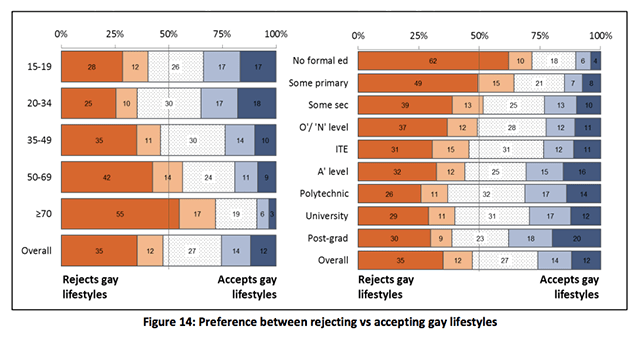
Overall, 47% of the sample group “rejects gay lifestyles.” 47% does not make so much as a simple majority, much less “society in general,” and yet, unsurprisingly, this is the angle both the IPS report and mainstream media coverage has chosen to take.
It could be similarly argued that the counterclaim of “53% are neutral or supportive of gay lifestyles” would be liberal spin, and perhaps it would – except no headlines are screaming this, so it’s also inconsequential. It’s worth bearing in mind that social progress does not require that a majority “accepts gay lifestyles”: it simply requires that most are okay with it or don’t care either way. Hearteningly, it seems that we’re there.
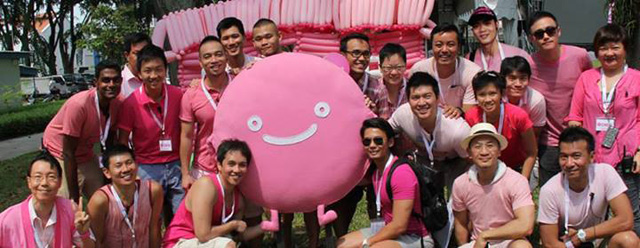
via Pink Dot SG
I am additionally skeptical of claims that the survey results lend credence to the popular narrative that most are unmoved by the issue. Dr Leong Chan Hoong, an IPS Senior Research Fellow, said, “Many Singaporeans are just indifferent to this issue, and the large percentage of ‘neutral’ corroborated that.”
It is true that 27% is a pretty large group of people reserving judgment or expressing indifference. Yet it is just as true that 73% – an actual, clear majority – are distinctly polarised on this.
In interpreting the results for the media, Dr Leong further mischaracterises the nature of the tension between these two polarised groups, using the analogy of right/left-handers:
“It doesn’t matter if a person is left-handed, even if the majority [is right-handed]. However, if left-handed people insist that we put in place an alternative left-handed device for every gadget, then, of course, there will be tension between the two groups.”
As mentioned earlier, it’s not clear that it really “doesn’t matter if a person is left-handed.” More importantly, it’s not true that us metaphorically left-handed people are “[insisting] that we put in place an alternative left-handed device for every gadget.” This presumes, firstly, that left-handed devices already exist – and they don’t. There are no provisions made for LGBTQ people (in stark contrast to the plenty put in place for heterosexual married people) in access to state institutions and resources at every level, from decriminalisation and anti-discrimination protections to access to public housing and healthcare.
Second, it also goes right back to this bizarre and yet strongly prevalent idea that we’re “promoting alternative lifestyles” with our devious left-handedness, and that the resultant aggression is our fault for asking too much when really people would’ve let us be if we’d just kept quiet.
Why don’t we have an alternative left-handed device for every gadget?
However the statistics are spun, the fact that 47% of Singaporeans have expressed negative attitudes about “gay lifestyles” is still a concern. These people aren’t apathetic, they’re actively homophobic in some way or form. But how? We run into yet another problem when we find that “gay lifestyles,” much less what it means to “reject” or “accept” them, has no meaning, which brings us to:
Asking All the Wrong Questions: Flaws in the Survey’s Design
So, “gay lifestyles.”
sometimes i imagine ducks pro-creating to the music of Backstreet Boys, and then the ducks take over the world. #gaylifestyles
— swagquack (@quacko_quack) August 25, 2013
https://twitter.com/POZboySG/status/371881585760407552
I don’t care. I am promoting my gay lifestyle. It is now Major Gay Lifestyle.
— Benjamin "Mr Miyagi" Lee (@miyagi) August 26, 2013
Most of the critique of the survey so far has been specifically about the use of this phrase, so I’ll point you in the direction of “Not Your Gay Lifestyle” by Sayoni, a queer women’s group and “This “gay lifestyle” bullshit needs to stop” by Kirsten Han, a freelance journalist. I also highly recommend this brilliant piece by artist Tania De Rozario satirising media coverage of the results.
The follow-up question on same-sex marriage simply strikes me as misplaced for a country that hasn’t so much as decriminalised gay sex and a civil society that has not explicitly vocalised this aim. In a survey about values, it is rather disingenuous to highlight a specific policy and especially such an unrealistic one. If we’re going down this route, why not just ask people what they think about 377A?
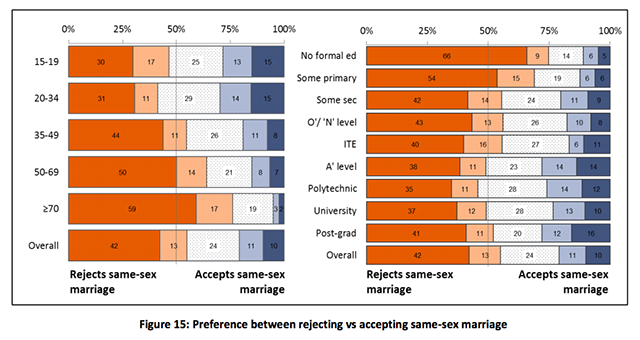
The integrity of a survey’s results is only as strong as the questions it asks. But honing in on this single issue would lead us to overlook its broader implications, which then brings us to:
This Shit (Sadly) Matters: Implications on Policy, Legislation… and Activism?
No amount of grousing about flawed terminology or methodology, no matter how valid, is going to stop this survey from being taken seriously in ways that matter – and likely at face value, too. Couched in the framework of the largest public engagement drive to date, undertaken by an established academic body and backed by the government, these survey results will influence legislation and political rhetoric for years to come. The 4,000 respondents here matter more than the 21,000 people at Pink Dot, the growing crowds at IndigNation, and everyone who’s participated in the non-government National LGBT Census.
We are not going to be able to discredit this survey or make it irrelevant. So we need to start thinking about what it means for us.
The government’s position for the past few years, mostly specifically on 377A, has quite consistently been “we’ll change when the majority changes.” Whether directly or indirectly, public surveys like these will feed into short-term decisions such as those on the pending constitutional challenges to 377A. The Court will likely pass the buck to Parliament which will then turn to “public opinion.” And here you have said opinion.
Some have seen signs for optimism in the results of this survey, pointing out that those who are younger and have more paper qualifications are less negative about “gay lifestyles.” I have my doubts.
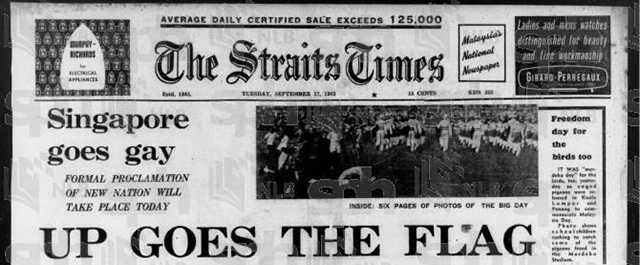
via @kixes
I don’t think we can assume the majority is moving slowly but inevitably towards acceptance. I’m not under the illusion that if only the survey had been worded better, it’d have revealed a different reality; I do believe that a significant part of the population is homophobic (not apathetic, but homophobic). While acknowledging that the results of this survey show marked improvements over past (similarly flawed) empirical studies of opinion, I don’t think it wise to take for granted that this will continue to be the case.
Asked whether the greater acceptance of gay lifestyles and same-sex marriage among younger age groups would indicate a more liberal society in future, Associate Professor Tan noted that there were two main theories in academic literature.
“One is that people change from being liberal to being more conservative as they grow older – more like a life-cycle kind of theory,” he said.
“The other theory is that, if you’re born in an era or in a certain generation where people tend to be liberal, you continue to be liberal throughout your life. So, you can’t really tell whether this is the case.”
The increasing visibility of the LGBTQ movement in Singapore has been met with vicious backlash, most notably from the leadership of Christian megachurches. It is far from a balanced fight: while Pink Dot’s 21,000 supporters is a figure (rightfully) bandied around with pride, Faith Community Baptist Church (FCBC)’s Lawrence Khong leads a 10,000-strong church and further sees himself fit to speak for LoveSingapore, “an informal, relational network of some 100 churches with a membership of at least 40,000 Christians.” Opposition politician Vincent Wijeysingha came out recently, but he clearly has significantly less sway (and one less political seat) than Emeritus Senior Minister Goh Chok Tong, who personally visited FCBC and who sits in a Parliament in which Christians are overrepresented.
The idea that most people don’t care is likely to hold less water as people become more politically engaged overall. There is no predicting which side their views will fall on this, and no use just hoping it’ll be on ours.
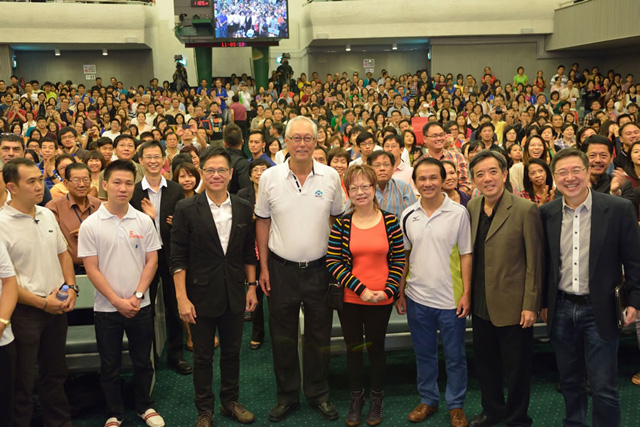
via FCBC
I’d further argue that the odds are stacked against us because while we can critique Leong’s left-handed analogy, to many people it probably seems that LGBT rights, especially same-sex marriage, would negatively impact straight people here — and they have reason to feel that way. We live under a government that quite specifically privileges the heteronormative two-parent nuclear family and places citizens in hierarchical order – sometimes competition – for access to state resources. Allowing queer people to get married and recognising queer-parented households as families means permitting us access to the plethora of policy privileges currently reserved for heterosexual citizens in housing, parenting provisions, and so on, and those resources are already perceived to be in short supply.
Focusing specifically on housing, which is both a key concern for all Singaporeans going forward and one in which discrimination based on sexuality (and marital status) is most apparent, the recent move to allow (a very small group of) single people to buy flats was welcomed but raised persistent fears about rising housing prices and the shortage of public housing. These concerns will only intensify – and have the potential to turn highly antagonistic – if gay married people are given housing ballot tickets too.
When people feel they’re losing out, they turn against the people they think they’re losing to. We see this in anger against immigrants (taking our jobs) and ethnic minorities (having too many babies, straining state welfare). As a minority group, not only will LGBT people always be vulnerable to changeable majority sentiment, current policies that privilege a certain family structure actively incentivise our exclusion.

via Pink Dot SG
More fundamentally, delving too deep into what the majority says and why runs the risk of losing sight that the rights of minority groups should never be subject to the whims of the majority. We cannot afford to wait to see if straight people will allow us to be and then let them decide how they will.
Yet this is clearly the path the government is choosing to take, so if nothing else, let the shitstorm this single survey statistic – symptomatic of a much larger system of institutionalised discrimination – has inspired remind us that our solution does not lie in the state. Our liberation will not come from appealing to the “silent majority.” Keep at “family-friendly” events like Pink Dot and challenges within the legal system, but never let this be the sum total of our movement: we need to be much, much more than “accepted.”








Comments
It’s been eight years since I moved away from Singapore, and every time I come across an article that has to do with LGBT rights in Singapore I hope that it’s good news, and every time I’m disappointed :(
I know absolutely nothing about Singaporean politics, so this article was enlightening! Thanks to Fikri for such great coverage. It’s so important to keep our discussion of LGBT rights in an international perspective and to bear in mind the different challenges that various parts of our community face. It’s disappointing to hear that this survey (whose results really sound pretty mixed) is being used to advocate against LGBT equality, and I’m sure that it will take great courage to move forward.
I am very sad to hear this. A few years ago, my ex-girlfriend and I went to Singapore for vacation. We were there for two weeks, and the whole time we were there, everyone was pretty accepting. While we were there, we weren’t trying to hide that we were girlfriends (holding hands, a kiss here and there) and I thought everyone was pretty accepting. We would get a few disappointed looks here and there but they are mostly from older people. But the younger generation had no care that we were gay at all. Oh well. I hope their government wakes up and stands up for equality.
Sigh. Sometimes it seems like our government gets paralyzed by their fear of “promoting” anything that goes against the status quo. So members of groups with less pull in society are the first to be distanced from.
Those survey questions make me cringe too. “gay lifestyles” is such a nebulous word, and in the context of Singapore, same-sex marriage isn’t a thing anyone expects to happen any time soon. Seriously, with the kind of resources and reach they have, the survey questions being so flawed frustrates me a lot. (I just really like data okay) While doing a school project a while back I think I came across this survey conducted by PLU that had way more detailed questions, understandably, though obviously the sampling was more flawed.
I guess I just don’t understand their perspective when forming these questions. Don’t they want to know what people think about 377A, about media censorship of LGBT portrayals(when i watch glee on singaporean channels I don’t know whether to cry or laugh), about sex ed, and a dozen other more relevant issues? It’s like the questions were searching for a snappy headline rather than any attempt to gather actual information.
Huh, the point about competing for state resources when legally recognizing same-sex relationships is something I never considered before. I can totally see resentment being caused by that, unfortunately. (“teh gays are stealing our hdb flats!”, anyone?)
And yeah, expecting the government to take a stance on this issue is futile. They’re clearly waiting to see which direction the winds finally go and then they’ll let themselves be blown in the same directions.
i agree with you on conservatism, but i think what’s troubling is that many people who make up ‘our government’ would personally defend this status quo. the frustrating thing about the rise of visibility for lgbt acceptance activism is that so much of the discussion ignores queer voices (or at best, quotes Alex Au) so that people think they’re learning about the issues BUT.THEY.ARE.NOT. so when it comes time to make decisions they can feel somewhat informed despite their complete lack of information.
I AM SO FRUSTRATED I AM SO FRUSTRATED I AM SO FRUSTRATED
seconding the frustration immensely. urgh.
<3
I expect that given the scale and importance of this survey, it must have been through plenty of years of clearance before anyone was ever sent out to ask people questions. My first thought is “and no one thought this was a bad idea?” followed quite quickly by “actually yes, yes it’s probably true that no one thought this was a bad idea.”
There is, of course, the possibility that the government will still stand their ground even if the winds were to blow our way eventually. I am ambivalent about this: on one hand, my gut instinct is they will actually do as they say (though there will be lag time in responding); on the other, I’m increasingly concerned by the massive influence, power and money of the anti-gay religious right.
(P.S. When I watch Glee I don’t know whether to laugh or cry and it has nothing to do with censorship.)
Vague survey questions disappoint me in general, but in this case it just highlights how far away the issue is from the people who write/review these questions.
The religious right in Singapore was something I kind of forgot about since the AWARE saga until the FCBC thing brought it up again. I am pretty interested in why Christians are over-represented in parliament, though. (is it just correlation of demographics or something in the selection process, since most parliamentarians are PAP members?) The possibility of them influencing the government is a pretty scary idea, but I feel like the government could never explicitly co-opt their reasoning, because that would clash with the whole secular thing.
And then I remembered that most of the replies the government gives, when it’s not “that’s the way it always is so we leave it like that”, is pretty much rooted in that kind of ideology, what with them privileging the heterosexual family dynamics. So, it wouldn’t require a huge shift in messaging, though it would probably require the leadership to be more invested in the issue, I’d guess.
(Oh, when I saw Glee on SG tv for the first time I was well into the hate-watching phase, but seriously the censorship made already disjointed plots even more disjointed. It was kind of fascinating to observe what was permissible. Kurt and Blaine could go to a gay bar, could sling their hands around each others shoulders, but any contact beyond that was cut.)
“The idea that most people don’t care is likely to hold less water as people become more politically engaged overall.”
do you say this because people _are_ becoming more politically engaged?
also: to Sang – “Don’t they want to know what people think about 377A” i wonder if they asked this. if they didn’t, i would wager that was because many people who answered “neutral” would rather see it gone. why do you think they asked about same-sex marriage instead? these survey designers are smart. especially since critiques in mainstream media aren’t going to pick up on that.
That’s what I meant yep. And yes! Excellent point on what the likely responses to 377A would’ve been.
I couldn’t find the original questionnaire, but given that it was a door-to-door interview covering a LOT of topics and the “Social Values” section was close to the back, I think it’s pretty safe to assume that these were the only two questions asked.
“the rights of minority groups should never be subject to the whims of the majority” true. except ‘rights’ doesn’t work that way here at all. also that picture of the FCBC congregation is a bit horrific (SO MANY SMILING CHINESE PEOPLE). and there i thought chok tong could be friends with us ):
RIGHT? I don’t really think the problem here is with ESM Goh & his personal positions (which I don’t believe he’s articulated in recent years) but the fact that people like Lawrence Khong have access to him and others like him in a way that queer groups will never have. Not only in terms of literal meet-ups, etc. but also that they can and do manipulate the rhetoric of nationalism (“save the nation!!1!”) and majority representation — things which directly speak to politicians’ interests — in a way that queer people cannot (and, I’d say, should not).
But a note on him anyway: while he’s remembered most for the “gay civil servants” business, it’s also during his term as PM in the 90’s that state anti-gay measures really stepped up, so. I believe the only PAP politicians who supported the repeal of 377A in 2007 were Hri Kumar, Baey Yam Keng & Charles Chong.
yes, but he’s remembered for his remarks because that came later in the term, i would assume as a response to pressure from people outside calling him out on that shit
He backtracked on them on a BIG way though. Like, NDR big:
“As for my comments on gays, they do not signal any change in policy that would erode the moral standards of Singapore, or our family values. In every society, there are gay people. We should accept those in our midst as fellow human beings, and as fellow Singaporeans. If the public sector refuses to employ gays, the private sector might also refuse. But gays too, need to make a living.
That said, let me stress that I do not encourage or endorse a gay lifestyle. Singapore is still a traditional and conservative Asian society. Gays must know that the more they lobby for public space, the bigger the backlash they will provoke from the conservative mainstream. Their public space may then be reduced.
I am glad that conservative Singaporeans and religious leaders have made known their views on the matter, clearly but responsibly. I hope we will now move on and focus on more urgent challenges.”
This section came right after a remark about “allow[ing] bungee jumping and bar-top dancing … to let you decide for yourselves the level of excitement and risk you want.” It’s from 2003. I wasn’t aware that bungee jumping was explicitly banned before — kinda took it as a given since no one’s about to jump off Bukit Timah or Little Guilin anytime soon eh.
Anyway, individual PAP politicians’ views aren’t ever going to be relevant unless the party whip slackens, and it doesn’t. And just. People voting on this shit. Ugh.
Oh! Of course Alex Au has written a thing about this (credit where credit is due — he may be an asshat when it comes to women/religion/EVERYTHING but he is excellent at talking 90’s politics): http://www.blowingwind.org/forum/index.php?showtopic=14870
i think it’s more depressing that the “save the nation” rhetoric works, yknow? it’s SO effective i could cry
While I like to think it’s mainly the government’s position as well as the religious right and that the upcoming, new and younger generation, or even the very minority opposition parties would be more open. I had a bit of a rude awakening after Vincent Wijeysingha’s coming out around Pink Dot.
While Yahoo Singapore commentators aren’t exactly the standard to look up to… (http://sg.news.yahoo.com/blogs/singaporescene/politician-vincent-wijeysingha-comes-gay-man-facebook-071331920.html)
I did feel a similar sentiment from many, even supporters of the opposition, which was along the lines of, “Why did he need to come out?”. I can’t articulate this well, but it was really disappointing that most of them have failed to see the importance of civil rights for LGBT folks…
And fyi, Vincent Wijeysingha has just resigned from SDP; saying,
“I would like to inform you that I have taken the difficult decision to resign my membership of the SDP in order to explore how I can be of service to the wider cause of our civil liberties, a project which I believe to be the dominant mission of this present period.”
I caught the news about Vincent W when it broke and tbh I wasn’t surprised? The opposition parties are NOT more left-wing and they’ve never positioned themselves as that — just as an alternative to PAP, no matter where that alternative may lie. I was less than impressed with their leadership’s handling of the “gay agenda” business during GE 2011.
I am similarly begrudging of Vincent W distinguishing between “bread-and-butter” issues and “civil liberties” as if they were independent of each other and one belongs to “mainstream” politics and the other doesn’t (which is similar to what he said during GE 2011), but I understand that this was probably a move born out of personal circumstances just as much as, if not more than, a political shift. I disagree with his political positions but I have massive empathy for him as an out gay public figure, and I’m interested to see where he goes from here.
Thank you AS for continuing to give us non USian/Canadian coverage! And thank you Fikri for your wonderful reporting!
Shame on you Singapore.
Backward, ignorant, and bigoted 3-world mentality society.